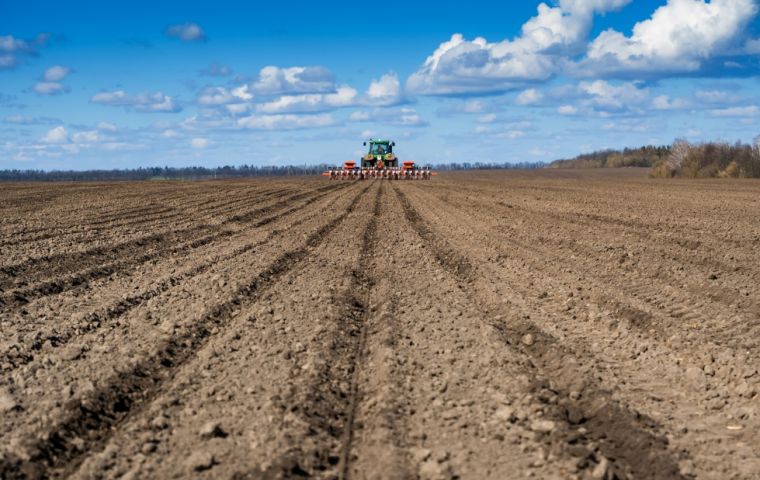MercoPress. South Atlantic News Agency
Russia determined to unblock fertilizer exports frozen in European ports
 There are 262,000 tons of Uralchem’s fertilizer frozen in ports of Estonia, Latvia, Belgium and the Netherlands
There are 262,000 tons of Uralchem’s fertilizer frozen in ports of Estonia, Latvia, Belgium and the Netherlands Russia is determined to unblock Russian fertilizers frozen in European ports, because of sanctions, and expects to resume ammonia exports through a pipeline across Ukraine. President Vladimir Putin made the announcement criticizing the current situation as totally unacceptable but admitted it is happening.
“All the time we are talking about the need to help the poorest countries and on issues completely unrelated to food security these supplies, even donations, are blocked, It is totally unacceptable”
At a meeting with Russian businessman Dmitry Mazepin, who gave up control of fertilizer producer Uralchem-Uralkali after he was hit by EU sanctions in March, Putin said Russia was ready to increase its fertilizer exports.
“The main problem was probably the fact that quite a lot of fertilizer was frozen in European ports,” Mazepin said at the meeting, which was shown on state TV.
There are 262,000 tons of Uralchem’s fertilizer frozen in ports of Estonia, Latvia, Belgium and the Netherlands, he said. Other producers, Acron and Eurochem, have 52,000 tons and almost 100,000 tons of their fertilizer stuck in Europe, respectively.
The cargoes are stranded because of the EU sanctions on the companies’ former owners, including Mazepin. Uralchem said on Nov. 12 it had agreed with the Netherlands, Estonia and Belgium to ship the fertilizer to African countries for free.
Mazepin also asked for Putin’s further help with resumption of Russian ammonia exports via a pipeline running from Russia through Ukraine to the Black Sea.
The export of ammonia, used in fertilizer, was not part of last week’s renewal of the Black Sea deal allowing Ukraine’s grain shipments, though the United Nations has been optimistic Russia and Ukraine could agree on terms for the pipeline.
“We had hoped that when there was a continuation of the grain deal, which was recently made, this issue would also be resolved. But I would like to report to you that the Ukrainian side puts forward a number of political issues that are outside our competence,” Mazepin said.
Putin answered: “We will also work with the U.N., with our colleagues from the organization. We will see what comes of it.”
Ukrainian President Volodymyr Zelenskiy said in September he would only back the resumption of ammonia exports via Ukraine if Moscow handed back prisoners of war, an idea the Kremlin rejected.
In related news United States authorized imports of Russian oil to Bulgaria and Croatia, and any landlocked country en the European Union, according to special License GL from the US Treasury Department.
The Treasury License follows on EU Council rules 879/2022, adopted last June, which basically allows Bulgaria to purchase, import or transfer Russian crude oil and derivates, transported by sea from 5 December 2022 to 31 December 2024. Likewise for Croatia, if no alternartive source is available, but from February 2023 to December 2023.
Similarly as of next December EU landlocked country can purchase Russian oil transported by sea is the pipelines supply from Russia is interrupted, until oil flows again normally or the EU decides to end the exception.
The initiative was requested by Sakhalin Energy, a subsidiary of Gazpron, which holds a 50% stake in the company together with Shell (27,5%), Mitsui from Japan (12,5%) and Mitsubishi, (10%).
The US Treasury License also indicates that one the Russian oil is significantly refined and turned into derivates, it will not be considered as catalogued from that origin.




Top Comments
Disclaimer & comment rulesCommenting for this story is now closed.
If you have a Facebook account, become a fan and comment on our Facebook Page!